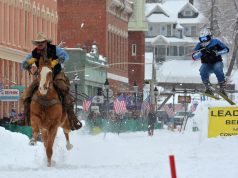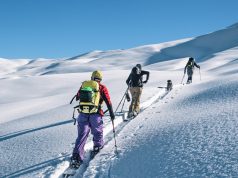Ever since Aron Ralston went and cut his hand off in a lost canyon in Utah, I’ve been thinking about risk.
As a journalist, I’ve specialized in covering extreme athletes and the world of action sports for more than a decade.
For most of the individuals I write about and photograph, hiking alone in a remote canyon, even if it involved a couple of rappels, wouldn’t give them a second thought. The level of perceived risk for these folks, even traveling solo and without leaving an itinerary, is negligible.
I’ve also examined my own experiences: travel to risky spots in the third world; ski mountaineering on high peaks in remote places; and, even, the inevitability of injury to the athletes at freestyle motocross events such as the Gravity and X Games. As I’ve considered these things — what drives the athletes I’ve covered, my own actions and the experiences of fellow journalists — I’ve become more intrigued with risk.
What exactly is risk? And why are risky activities so much a part of mainstream American culture? Where’s the joy in cutting off your own hand?
There is, interestingly enough, a gene that is associated with taking risks. Called D4DR, it’s been identified by scientists as being longer in people who are prone to risky behavior. Furthermore, other studies, including work done by Dr. Stefan Brene and published in the academic journal Behavioral Brain
Research, has shown that there is an addictive quality to adrenaline and
endorphins, two substances produced by the body in greater quantities
during times of stress and excitement.
The fact that a predilection for risk is
ingrained in some people and that adrenaline is addictive will come as
no surprise to many who live in Boulder. After all, the climbing,
skiing, backpacking and other outdoor pursuits that involve risk are the
reasons that many of us moved here in the first place. Activities like
climbing or snowboarding are all risky activities with big time payoffs
for adrenaline junkies. Risk and the type of personalities that seek it
out are part of the fabric of Boulder.
So, while the verdict is still out on the
ultimate effect of having a D4DR gene or the real impact of an addiction
to adrenaline and endorphins, it’s probably safe to say that most of
the active types who live here are cursed with both the gene and the
addiction. We can also probably assume that Ralston is similar in his
biological makeup to many of us and that many of his actions prior to
his accident were, in part, governed or influenced in some way by this.
But in addition to the
genetic and chemical influences that contribute to a propensity for
risk taking in humans, there are cultural forces at work as well. The
fabric of American life has been shaped by risk takers. As Anthony
Brandt, a columnist for National Geographic has noted, “adventure has
become deeply embedded in the culture.” America’s cultural icons, from
Lewis and Clark to Jake Burton, the father of the snowboarding industry,
have been gamblers, heading into the unknown or creating new sports out
of nothing.
Two
Americans, William Howard and Jeremiah van Rensselaer were the first to
climb one of Europe’s highest peaks, Mont Blanc, merely for the thrill
of getting to the top, rather than to make scientific observations.
Americans reinvented skiing twice — first in the 1970s with the
introduction of hotdogging (now freestyle skiing) and then again in this
decade with the park and pipe skiing featured so prominently in the
Winter X Games held in Aspen.
Skateboarding was invented in America, and that
sport’s modern form was shaped by a bunch of punks in California like
Tony Alva, whose progressive pool riding laid the groundwork for modern
day hero and skateboarding legend Tony Hawk. (As an aside, it is
interesting to note that in polls among teens, Hawk is consistently one
of the most recognizable athletes of this era, beating out pro football
and baseball players easily, matching the exposure of NBA luminaries
like Michael Jordan).
What does all this mean to the average Joe on the street? It
means that taking chances has always been an accepted part of living in
this country and that Americans view risk, particularly when it comes to
sports and recreation with less fear and suspicion than people from
other countries. (If you’ve ever skied in Europe, you’ll notice that
it’s your American buddies who are heading off of the groomed trails,
not the Euros.) It’s the reason why automobile manufacturers sell so
many SUVs and hype them with advertisements depicting extreme behavior.
It’s why we drink Mountain Dew for breakfast and do stupid things like
going hiking alone in the desert.
But it’s also why we invented snowboarding, have a TV
network, ESPN, that hosts the only credible international winter games
outside the Olympics in Aspen (no ice dancing here, thank you very much)
and have one of the most dynamic societies in the world. After all, no
risk, no reward.
Take
chances, have fun Want to taste a bit of adrenaline?
These folks can help.
Climb a cliff Boulder’s
Colorado Mountain School offers a variety of rock, ice and mountain
climbing courses. With classes for kids, adults and families, there’s
something for everyone, including folks who want to test themselves on
big peaks in the Andes or who just want to get off the couch and up on
the Flatirons. totalclimbing.com
Fly like an eagle Based in North Boulder,
Parasoft Paragliding can get you off the ground quickly. Classes start
with tandem flights with an instructor doing the flying and move on to
obtaining advanced flying licenses. parasoftparagliding.com
Fall like a rock For
those addicted to adrenaline, there’s nothing quite like jumping out of
a plane. Maximize the rush and minimize the risk with skydiving
lessons, tandem jumps and other instruction at Mile-Hi Skydiving in
Longmont. mile-hi-skydiving.com
Shred the gnar It doesn’t get much more
American than the sport of snowboarding. Learn to ride at Eldora ski
area. The closest mountain to Boulder, you can be on the chair at Eldora
within 45 minutes of getting into your car. The ski area offers lessons
for all abilities, including a firsttimers lesson for $99. eldora.com
Respond: [email protected]














